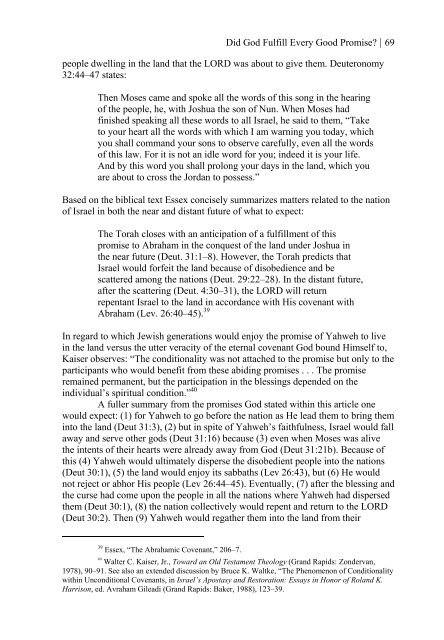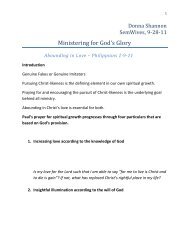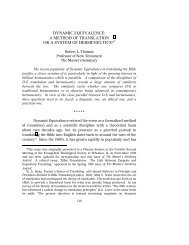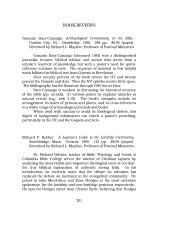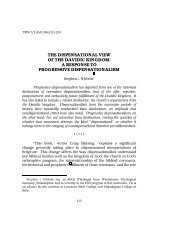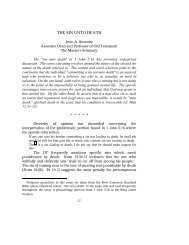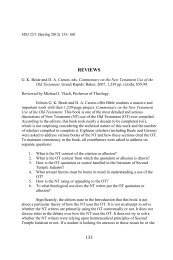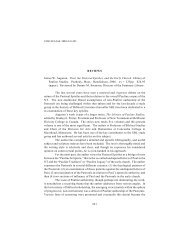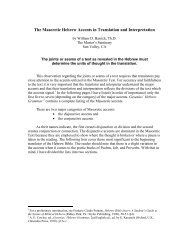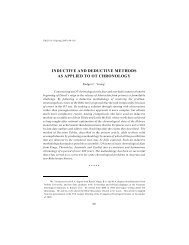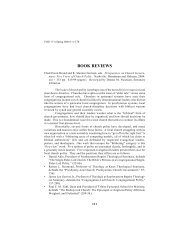Did God Fulfill Every Good Promise? - The Master's Seminary
Did God Fulfill Every Good Promise? - The Master's Seminary
Did God Fulfill Every Good Promise? - The Master's Seminary
You also want an ePaper? Increase the reach of your titles
YUMPU automatically turns print PDFs into web optimized ePapers that Google loves.
<strong>Did</strong> <strong>God</strong> <strong>Fulfill</strong> <strong>Every</strong> <strong>Good</strong> <strong>Promise</strong>? | 69people dwelling in the land that the LORD was about to give them. Deuteronomy32:44–47 states:<strong>The</strong>n Moses came and spoke all the words of this song in the hearingof the people, he, with Joshua the son of Nun. When Moses hadfinished speaking all these words to all Israel, he said to them, “Taketo your heart all the words with which I am warning you today, whichyou shall command your sons to observe carefully, even all the wordsof this law. For it is not an idle word for you; indeed it is your life.And by this word you shall prolong your days in the land, which youare about to cross the Jordan to possess.”Based on the biblical text Essex concisely summarizes matters related to the nationof Israel in both the near and distant future of what to expect:<strong>The</strong> Torah closes with an anticipation of a fulfillment of thispromise to Abraham in the conquest of the land under Joshua inthe near future (Deut. 31:1–8). However, the Torah predicts thatIsrael would forfeit the land because of disobedience and bescattered among the nations (Deut. 29:22–28). In the distant future,after the scattering (Deut. 4:30–31), the LORD will returnrepentant Israel to the land in accordance with His covenant withAbraham (Lev. 26:40–45). 39In regard to which Jewish generations would enjoy the promise of Yahweh to livein the land versus the utter veracity of the eternal covenant <strong>God</strong> bound Himself to,Kaiser observes: “<strong>The</strong> conditionality was not attached to the promise but only to theparticipants who would benefit from these abiding promises . . . <strong>The</strong> promiseremained permanent, but the participation in the blessings depended on theindividual’s spiritual condition.” 40A fuller summary from the promises <strong>God</strong> stated within this article onewould expect: (1) for Yahweh to go before the nation as He lead them to bring theminto the land (Deut 31:3), (2) but in spite of Yahweh’s faithfulness, Israel would fallaway and serve other gods (Deut 31:16) because (3) even when Moses was alivethe intents of their hearts were already away from <strong>God</strong> (Deut 31:21b). Because ofthis (4) Yahweh would ultimately disperse the disobedient people into the nations(Deut 30:1), (5) the land would enjoy its sabbaths (Lev 26:43), but (6) He wouldnot reject or abhor His people (Lev 26:44–45). Eventually, (7) after the blessing andthe curse had come upon the people in all the nations where Yahweh had dispersedthem (Deut 30:1), (8) the nation collectively would repent and return to the LORD(Deut 30:2). <strong>The</strong>n (9) Yahweh would regather them into the land from their39 Essex, “<strong>The</strong> Abrahamic Covenant,” 206–7.40Walter C. Kaiser, Jr., Toward an Old Testament <strong>The</strong>ology (Grand Rapids: Zondervan,1978), 90–91. See also an extended discussion by Bruce K. Waltke, “<strong>The</strong> Phenomenon of Conditionalitywithin Unconditional Covenants, in Israel’s Apostasy and Restoration: Essays in Honor of Roland K.Harrison, ed. Avraham Gileadi (Grand Rapids: Baker, 1988), 123–39.


